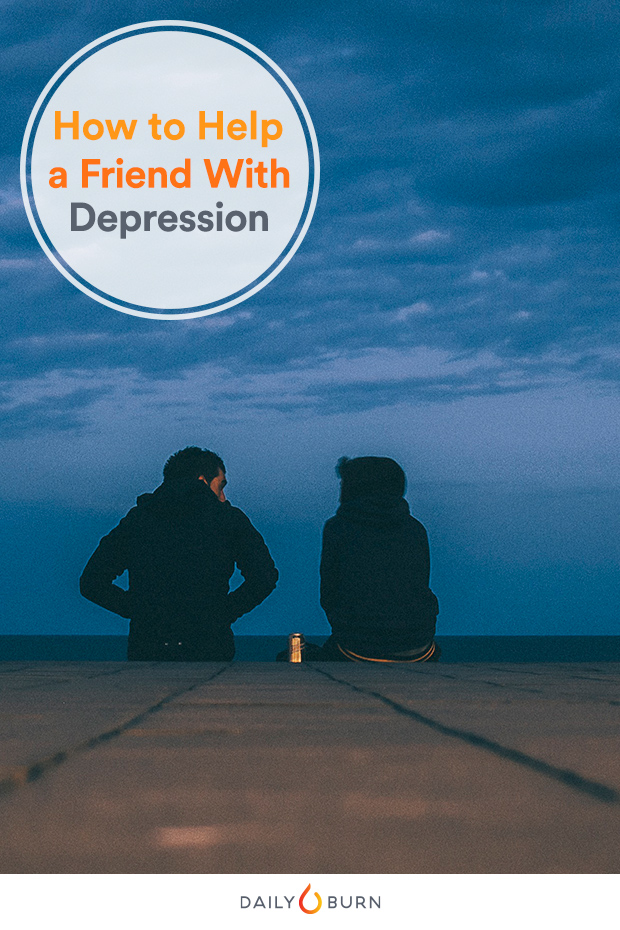
If you suspect a friend is struggling with depression, you may feel unsure about what to say. Maybe you feel like you’re walking on eggshells. After all, you’re concerned about saying or doing something that will make them feel worse.
“There’s no perfect way to help,” says Katherine Schafler, LMHC, a NYC-based therapist. “There’s no guaranteed statement that won’t offend, hurt or otherwise upset someone.” According to 2014 stats from the National Institute of Mental Health, 15.7 million American adults suffered from at least one depressive episode that year.
While no two experiences (nor their resolutions) will be the same, experts have found a few general guidelines to help steer the conversation in the right direction. Here are a few strategies, outlined by Schafler, to support your loved one through his or her tough times.
RELATED: 7 Daily Habits That Are Sabotaging Your Mental Health
7 Ways to Help a Friend With Depression
1. Share the dilemma.
If you’re about to say something, and you worry about how it will be interpreted, say that, says Schafler. “You should acknowledge your awareness of how your statement might come across,” she says. By doing this, your loved one will be more receptive to what you’re saying.
For example, you might say: “I have something that I want to tell you but I’ve been hesitating because it’s one of those things that can come out so clumsily, and the last thing I want is for you to feel upset or alienated.”
RELATED: 7 Self-Care Rituals to Practice Every Day
2. Ask specific questions.
“If you’re saying ‘I’m worried you might be an alcoholic,’ the listener has nowhere else to go from there,” says Schafler. A declaration like this can feel like you’re dropping a bomb on a person, and it feels intense and judgmental. A better way to approach is to ask: “Have you been feeling like yourself lately?” She says that this gives the listener an opportunity to open up.
3. Let the other person hurt.
Telling someone, “It will be OK,” may be motivated by our own discomfort with other people’s pain, says Schafler. While your reassurance likely comes from a good place, it doesn’t give your pal the space for their own hurt to exist. This isn’t easy, Schafler says, but accepting your own distress with your loved one’s struggle can help you meet them in a place of acceptance.
RELATED: How to Overcome Anxiety, Starting Now
4. Just listen.
“For many people struggling with depression,” says Ryan Howes, Ph.D., a therapist in California, “what they need most are your ears, not your words.” They need to talk about sadness, anger, grief, anxiety — or any number of difficult events from their past. “Just sitting and listening can be a tremendous gift.”
5. Offer help.
You wouldn’t be ashamed to go to a doctor for a broken arm, right? “But finding a therapist can be difficult for anyone, let alone someone suffering the energy-depleting symptoms of depression,” says Howes. “Offer to help them with research, asking friends, doing an online search or even making that initial call for them.” Helping to match them with the care they need may be the best assistance you can give, he says.
6. Tell them: “I’m here for you.”
This is one of the most simple things you can say, but it’s one of the most helpful. Among the more common symptoms of depression is a feeling of isolation and a sense that nobody cares. “Telling them — and showing them — is one of the most loving gifts you can give,” says Howes.
RELATED: Stressed? These GIFs Will Help You Relax
7. Say the words.
And speaking of loving gifts, sometimes “I love you” is the most powerful thing you can say. “A depressed friend may not feel lovable,” says Howes, “but it’s still important for them to hear they are loved and can count on you during this dark time.”
The content in this article is not meant to replace professional medical advice. If you or someone you know is in crisis, call the National Suicide Prevention hotline at 1-800-273-8255. To see a list of resources in your area, head here.
